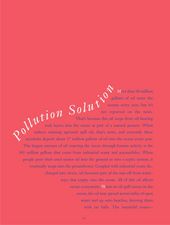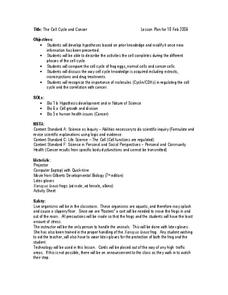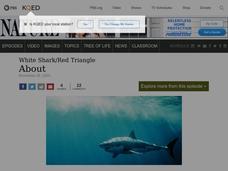Curated OER
The Same But Different
Fourth graders observe different types of bats. They look for characteristics that appear to be fundamental for survival. Students observe population numbers in order to identify if adaptations aid in survival.
Curated OER
Hunting For Bats
Fourth graders investigate the adaptations that occur in bats. The benefits of adaptations are discussed with them and the probability of survival is measured. The specific adaptations are written and defined.
Curated OER
Superhumans and Bionics: Building Hi-Tech Exoskeletons
Students explore how the body works. Students experiment and participate in activities to compare speed to stride length. Using the data collected, students draw conclusions about the biology of dinosaurs, their speed and stride length.
Curated OER
AP Biology Demonstrations
Students explore difficult-to-understand topics in biology. In this biology instructional activity, students participate in a series of demonstration on genetics, evolution and many others to gain insight on these topics. They write a...
Curated OER
Space Settlement Design
Students work on a project in which they must design a space settlement. Once the teams have begun their research, have the project manager report to the instructor each day on progress or any difficulties encountered.
Curated OER
Sustaining Life Under the Ice
Students design and conduct experiments in order to identify the components of lake water environments that are affected by winter ice cover. They use the experiment results to propose effective human management of these ecosystems.
Curated OER
Pollution Solution
Fourth graders examine how trees help to absorb the pollution that is emitted from automobiles. They review the process of photosynthesis and determine how forest management is important on their reservation. They think about the...
Curated OER
Wind Effects on Model Building: Lab for Deflection and Moment of Inertia
Students investigate the relationship between shape of object and moment of inertia. In this physics lesson, students collect data from the experiment and use spreadsheet to graph them. They discuss how load affects deflection.
Curated OER
A Community Decision!
Students investigate waste management through a simulated role-playing activity. They use a decision chart to organize their presentatioins and justify their decisions.
Curated OER
Native Plant Restoration Project
Students distinguish between exotic and native plant species. They work in groups in the field to restore a natural habitat. A class map is created to reflect their work in the field.
Curated OER
Travelogue of a Planet
Students randomly select a planet, including Earth. They research key features of the planet including mass, volume, density, gravity, temperature, weather, geology, atmosphere, surface features, location from sun, Earth and other...
Curated OER
Crickets on the Hearth
Middle schoolers investigate how crickets behave in cold temperatures. In this life science lesson, students explain the beneficial and harmful effect of pests. They research ways to properly manage them.
Curated OER
Musical Plates
Sixth graders engage in a study of the plates and how they are part of the formation of the ever changing landscape of planet earth. They access web sites that have applications for observation and conducting different activities. The...
Curated OER
The Cycle of Restoration
Students describe what is meant by restoration cycle. In groups, they create a poster to show the cycle of restoration work. After presenting their poster, they discuss the actions that can be done for each season. To end the lesson,...
Curated OER
Watershed Delineation
Young scholars use topographic maps to delineate a watershed.In this ecology lesson, students draw the boundaries of a watershed onto a map using contour lines as a guide. Their resulting maps are used to evaluate their understanding.
Curated OER
Water Taste Test
Learners brainstorm the different characteristics of potable water. In this general science instructional activity, students test several water samples and hypothesize which samples and brands they are. They discuss where drinking water...
Curated OER
Classification: Dichotomous Key
Students explain the classification process of organisms. In this biology lesson, students practice writing the names of organisms scientifically. They answer the dichotomous key and discuss answers as a class.
Curated OER
Teaching Strategies and Laboratory
Young scholars reflect on a new concept by having the teacher prompt them with a specific question. They use their science handbook to look up keywords within the topic question asked. Students use this only as a rerence to gain...
Curated OER
Dumptown Game
Students engage in an interactive play scenario. They are the new managers of a fictional city and live in a place where nothing is recycled. Students are faced with various problems that need to be solved. They work together to propose...
Curated OER
How Things Fly
Students observe photographs of selected twentieth-century aircraft at the National Air and Space Museum and note differences in the design of aircraft wings, fuselages, and engines.
Curated OER
The Rotten Truth
Learners study the process of decomposition using lunch leftovers and soil. They complete the inquiry over set periods time as they observe the how composting takes place and finally, they sort the materials into biodegradable,...
Curated OER
Is Your Water Clean?
Students conduct tests of water samples from different sources, such as a local river, tap water, and an irrigation ditch. After determining which pollutants are present in each sample, students hypothesize the possible sources of the...
Curated OER
The Cell Cycle and Cancer
Students compare and contrast the cell cycle of frog eggs, normal cells, and cancer cells. They watch a video about early development of the frog embryo, generate a hypothesis in small groups, and listen to a teacher-led lecture. ...
Curated OER
Shark Attack
Young scholars examine the white shark. They think critically about a set of shark facts and predict whether the statements are true or false. Students describe a year in the life of a white shark living in the Red Triangle. They...

























